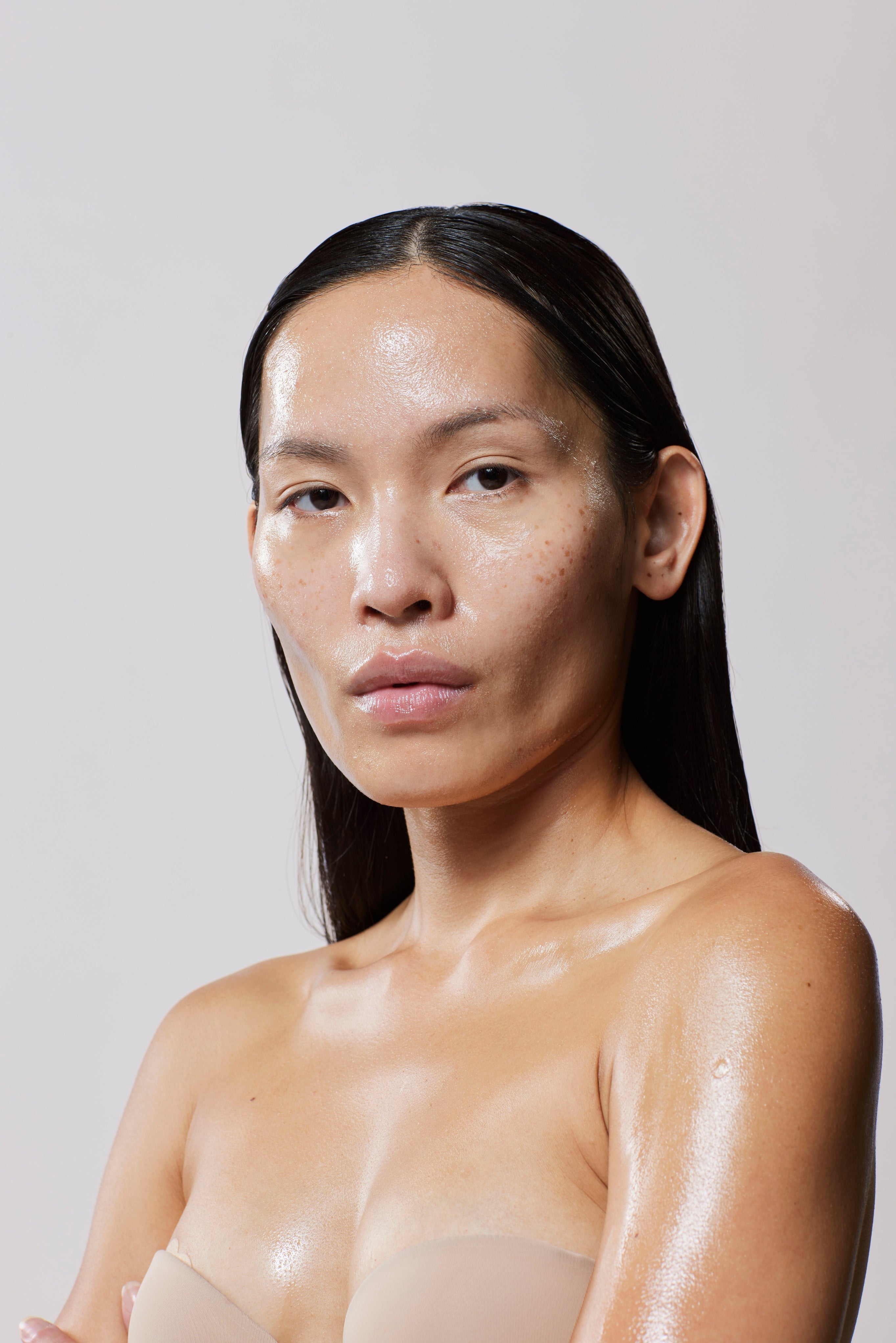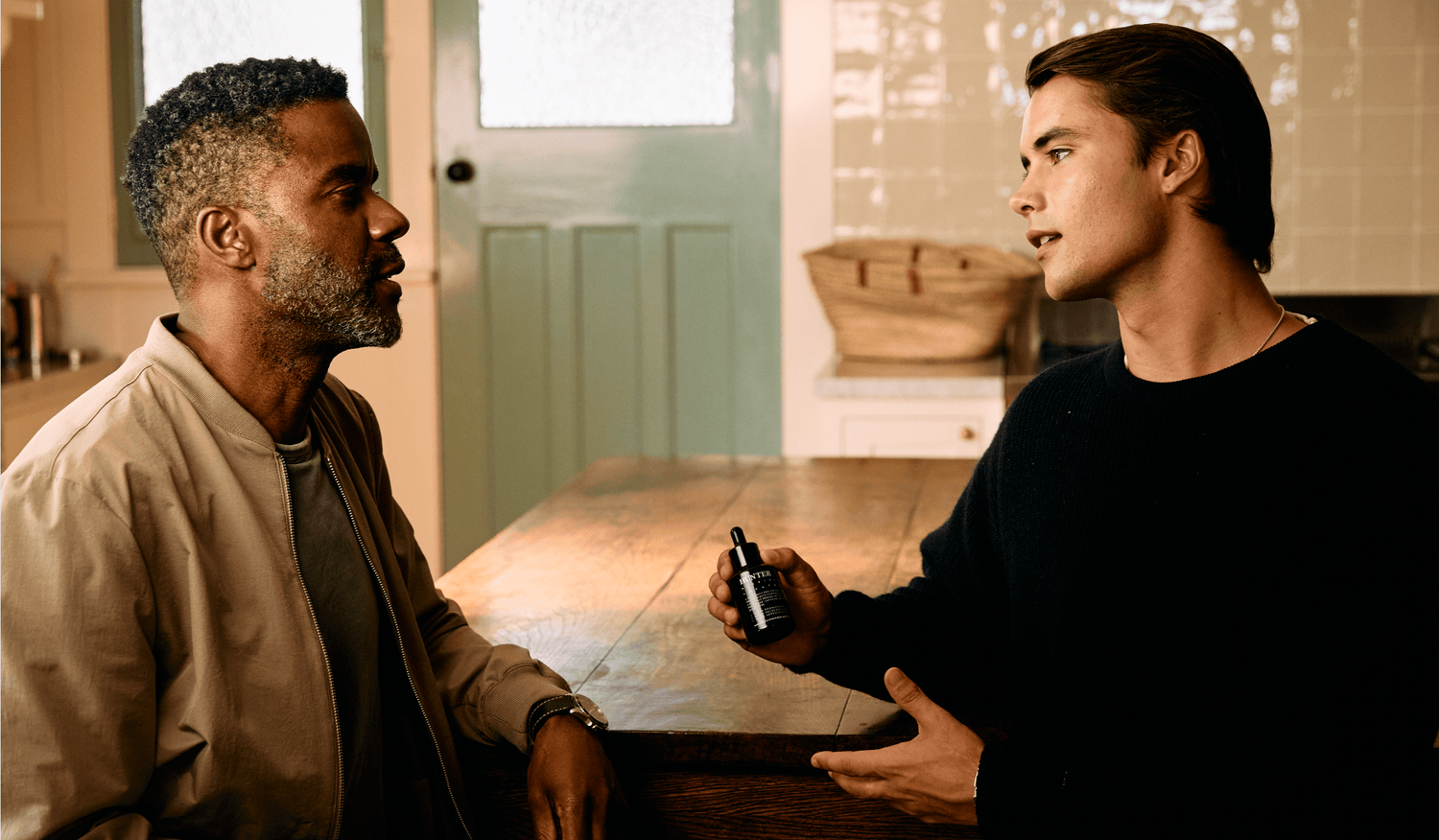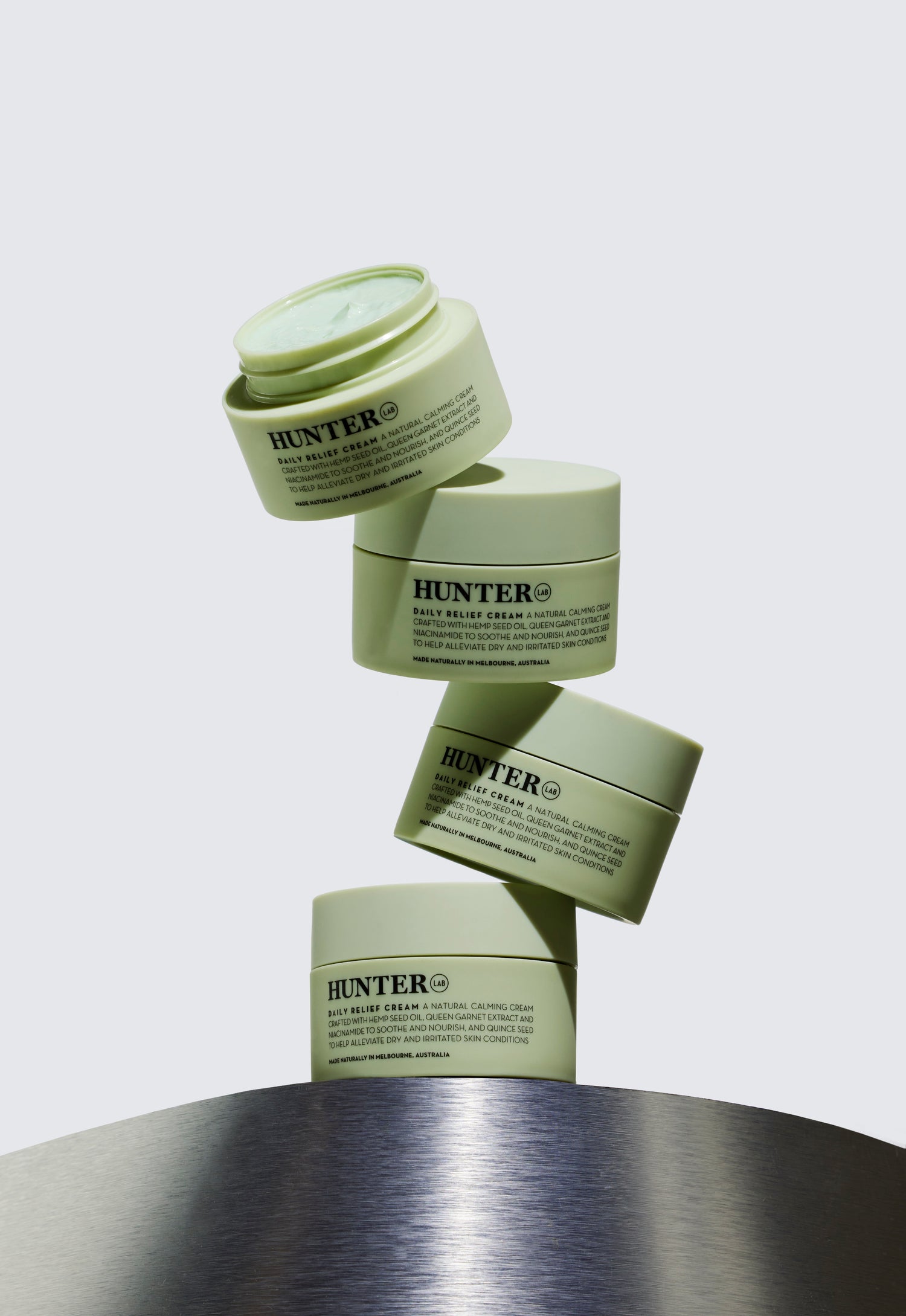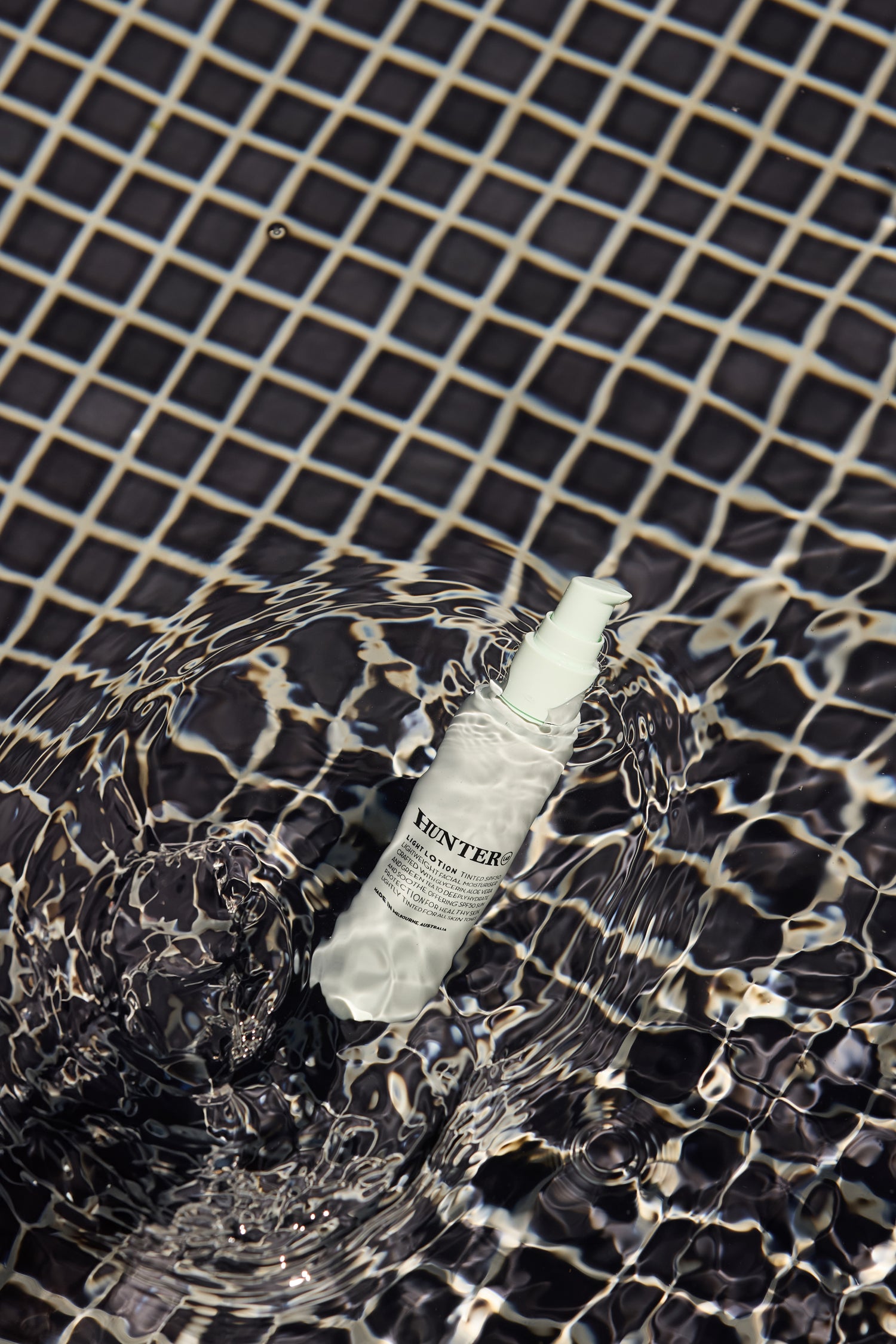Oily skin, often misunderstood and mismanaged, needs specialised care and understanding and can be frustrating to deal with.
However, with the right knowledge and tools, managing oily skin can transform it into a healthy, balanced, and vibrant asset.
This detailed guide sheds light on the best practices for managing oily skin, ensuring it stays healthy, balanced, and vibrant.
But First, What is Oily Skin?
Understanding the oily skin type
Oily skin is characterised by an overproduction of sebum, leading to a glossy appearance, enlarged pores, and a tendency toward acne and blackheads.
Various factors, including genetics, hormones, and environmental influences, contribute to this skin condition.
Oily skin or combination skin?
Understanding the distinction between oily and combination skin types is crucial for implementing an effective skincare regimen.
Oily skin is generally characterised by an excess production of sebum across the entire face. This leads to a consistent shine and often enlarged pores, primarily due to overactive sebaceous glands. This skin type is more prone to acne and may feel greasy throughout the day.
In contrast, combination skin exhibits a mix of dry and oily areas.
The classic combination skin type features an oily T-zone (forehead, nose, and chin) and dry or normal skin on the cheeks and other areas. This variance can make skincare slightly more complex, as it requires balancing products that cater to both the dry and oily regions of the face.
Sound like you? You can read more about combination skin here.
Tailored Daily Skincare for Oily Skin
1. Cleansing: deep yet gentle
For oily skin, the key to effective cleansing lies in finding a balance between removing excess oil and preserving the skin’s natural protective barrier.
Over-cleansing or using harsh products can strip the skin of its essential oils, leading to increased oil production as a reactive measure.
It's essential to use a gentle cleanser that can effectively dissolve and remove excess sebum, dirt, and impurities without over-drying the skin.
The Hunter Lab Charcoal Cleansing Stick is formulated with activated charcoal, deeply cleansing the pores while maintaining the skin's natural balance, making it an ideal choice for those with oily skin.
2. Moisturising: light and non-comedogenic
Contrary to common misconceptions (and temptations on a humid day), oily skin requires proper hydration to maintain its health and prevent the overproduction of sebum.
The goal is to choose a moisturiser that hydrates and nourishes without adding to the oiliness.
Look for lightweight formulas that provide essential hydration without clogging the pores.
Products like the Hunter Lab Daily Face Fuel are designed to meet these needs.
Its light formulation ensures that it hydrates and soothes the skin without leaving a greasy residue, promoting a balanced and healthy complexion.
3. Sun protection: essential for oily skin
Sun protection is a critical step in any skincare regimen, regardless of skin type.
For oily skin, the challenge is to find a sunscreen that provides adequate protection without exacerbating oiliness or causing breakouts.
A broad-spectrum sunscreen with a lightweight, non-greasy formula is ideal. It should offer high SPF protection while remaining comfortable and invisible on the skin.
Products that are specifically designed for oily skin can help shield your skin from harmful UV rays while maintaining a clear, matte finish, thus combining protection with aesthetic appeal.
Special Attention for Oily Skin
Exfoliation: managing oil and acne
Regular exfoliation is pivotal in the management of oily skin.
About 2-3 times a week, exfoliation helps in balancing oil levels and preventing acne breakouts. It works by removing the buildup of dead skin cells and excess sebum which can clog pores and lead to acne.
However, it's crucial to use a product that is effective without being overly abrasive.
The Hunter Lab Cleansing Facial Scrub is designed for this delicate balance. Its formulation gently exfoliates the skin, removing excess oil and dead skin cells without causing irritation.
This keeps the pores clear and helps in maintaining a smooth, clear complexion, making it an essential step in the skincare routine for oily skin types.
Masks: deep cleanse and oil control
Using clay-based or oil-absorbing masks is an effective way to deeply cleanse and manage oil production in oily skin.
When used weekly, these types of masks can significantly improve the skin’s overall condition by drawing out impurities and excess oil.
This process not only helps in achieving a clearer complexion, but also aids in balancing the skin’s natural oil production.
The Hunter Lab Charcoal Mud Mask is an excellent choice for such a deep cleansing treatment.
Crafted with activated charcoal, bentonite, and kaolin clay, it excels in purifying pores and removing impurities.
Additionally, ingredients like Aloe Vera, Vitamin A, and E in the mask hydrate, soothe, and nourish the skin – an essential combination for those seeking to control oiliness and maintain balanced, radiant skin.
Lifestyle Adjustments for Oily Skin
Diet: mindful eating for skin health
Limit processed foods: Processed foods often contain high levels of sugars and fats that can exacerbate skin conditions, including oily skin. Reducing intake of these foods can help manage skin issues.
High in fruits, vegetables, and lean proteins: These foods are rich in essential nutrients and antioxidants that support overall skin health. Antioxidants help combat oxidative stress, which can affect the skin's health and appearance.
Foods rich in omega-3 fatty acids: Omega-3s, found in foods like fish, flaxseeds, and walnuts, are known for their anti-inflammatory properties. They can help regulate oil production in the skin and improve its overall condition.
Stress and sleep: regulating sebum production
Effective stress management: Chronic stress can trigger changes in hormone levels, particularly cortisol, which can stimulate the oil glands in the skin to produce more sebum. Managing stress through mindfulness, relaxation techniques, or other stress-reduction methods can therefore help regulate oil production.
Quality sleep: During sleep, the body undergoes repair and regeneration processes, which include balancing hormones and maintaining skin health. Lack of sleep can disrupt these processes, potentially leading to increased sebum production and aggravated skin conditions.
Regular physical activity: Exercise is beneficial for overall health, including skin health. It can improve circulation, which helps nourish skin cells and can also help in stress reduction, indirectly benefiting the skin.
Conclusion: Harmonising Oily Skin Care
Remember, caring for oily skin is a continuous process of learning and adapting.
It’s about finding joy in the small rituals, celebrating the improvements, and being patient with the process.



